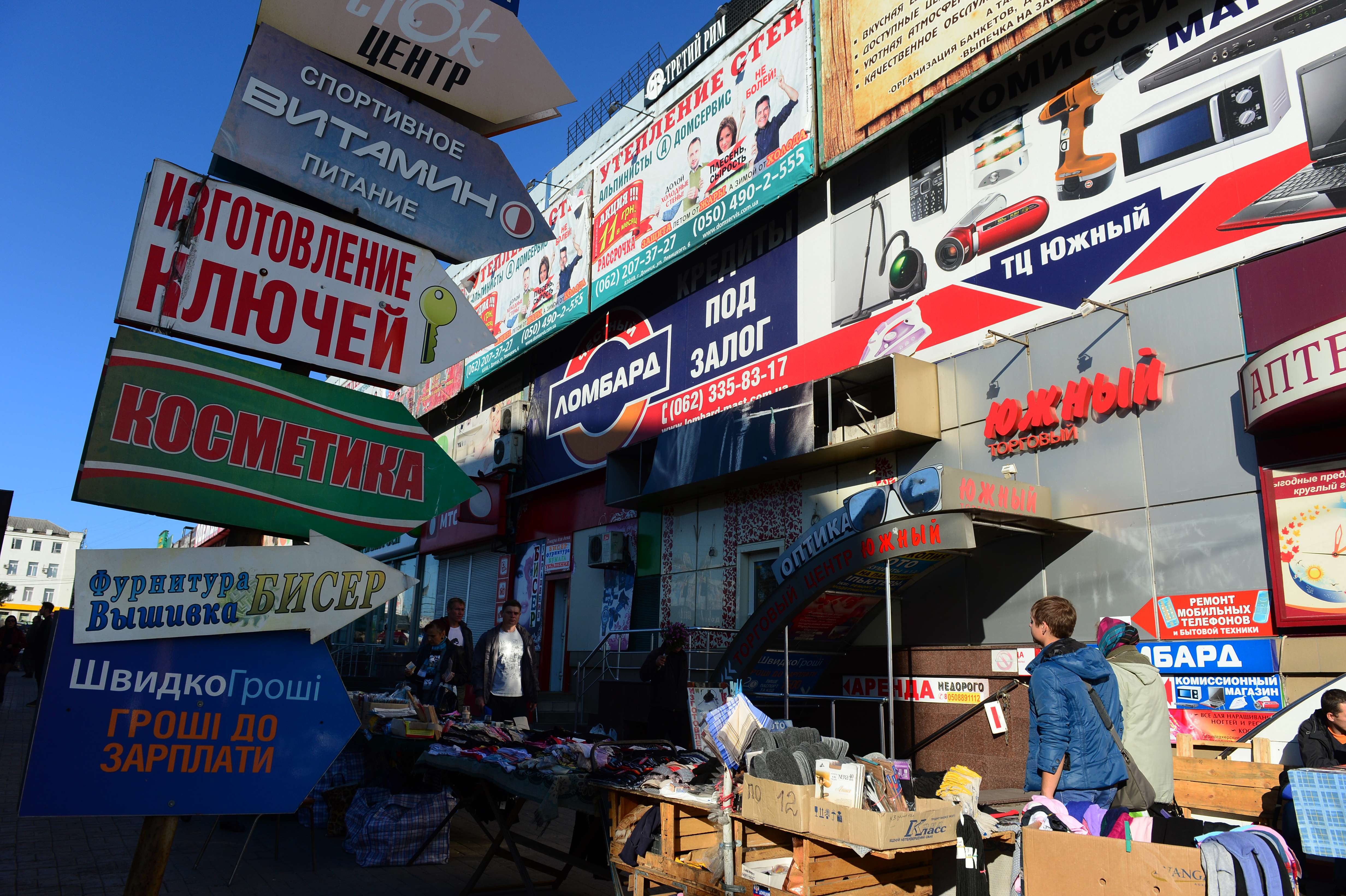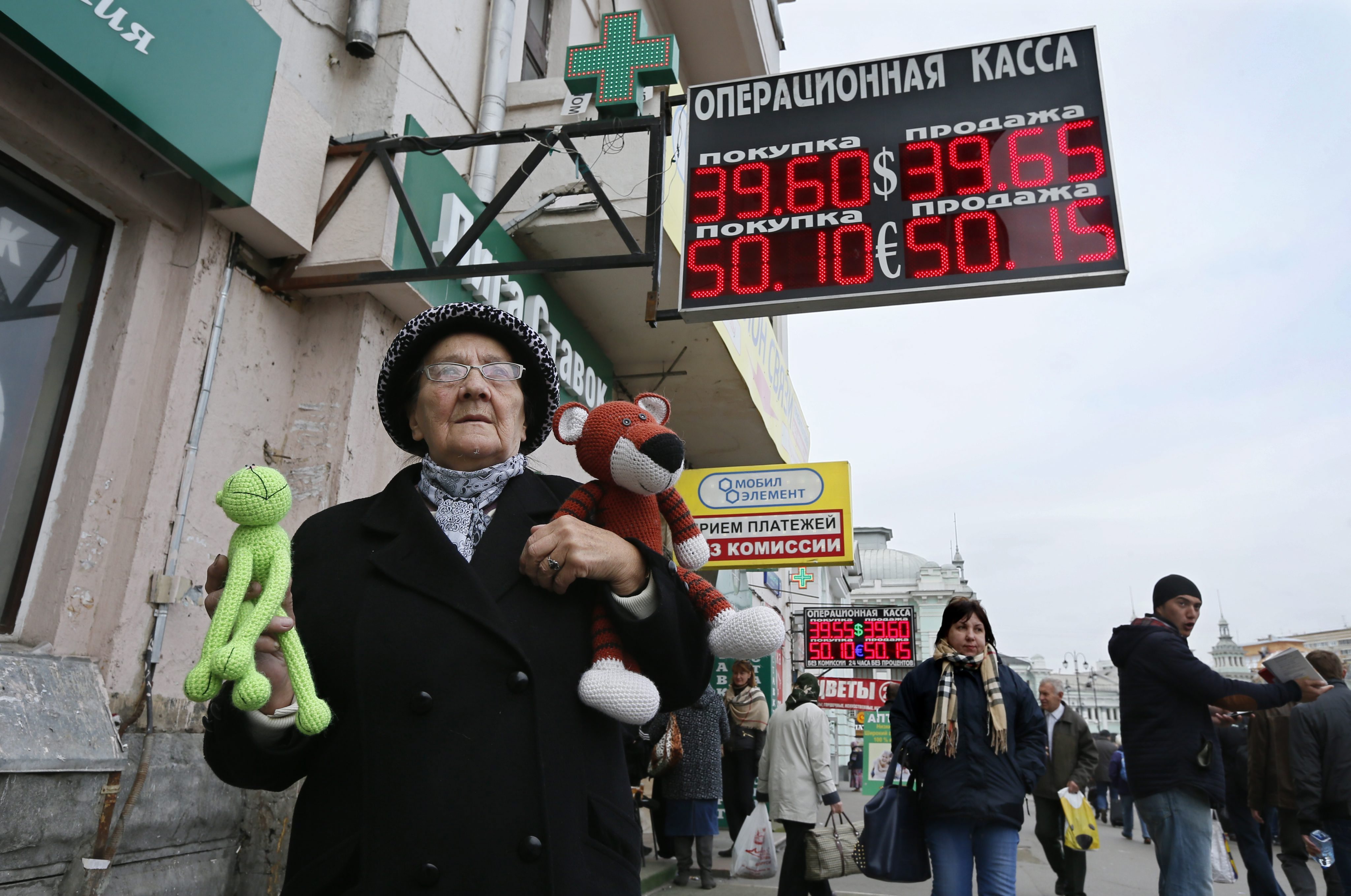MOSCOW — Deep into the worst conflict between Russia and the West since the Cold War, investors are fleeing, food prices are soaring and there are rumbles from Russia’s Westernized business elite that the nation needs to avoid repeating the economic mismanagement that broke apart the Soviet Union.
Western sanctions have choked off financing to some of Russia’s economic juggernauts and denied crucial technology to the nation’s energy sector. But there is little evidence that the mounting economic pressures since the March annexation of Ukraine’s Crimean Peninsula will soften Putin’s policies toward Ukraine and other nations in the former Soviet orbit. Putin still enjoys sky-high approval ratings, and ordinary Russians say they are ready to make sacrifices in a battle with the West.
Because of economic warfare with Europe, meat and vegetable prices have risen dramatically. Travel abroad has dropped so swiftly that dozens of tour operators were bankrupted this summer, leaving some tourists stranded in Turkey and Egypt. Portions of Russian savers’ pension funds have been appropriated by the state to prop up the country’s companies.
Russia has been sliding swiftly into economic stagnation, with analysts estimating only meager growth in 2014 and a recession that may have begun in the year’s final quarter. Oil prices, which underpin key assumptions of Russia’s budget, are falling. Investors pulled almost $75 billion out of the country in the first six months of the year alone, a sign that any real prospects for new growth may be a long time coming.
Further bad news comes every day. The ruble is down 20 percent since the beginning of the year, and it slid to new lows this week. Russia’s central bank spent at least $3 billion this month to slow the ruble’s decline, depleting the nation’s still-mighty foreign currency reserves.

Stalls are seen at an outdoor market in Donetsk. (John MacDougall/AFP/Getty Images)
The fears of Russia’s wealthy elite have been heightened following the mid-September house arrest of one of their own, Vladimir Yevtushenkov, on charges of money laundering. Associates say the detention is a signal that one of the central tenets of the Putin era has come to an end: that corporate titans would be free to make vast sums of money so long as they steered clear of politics. Yevtushenkov adhered to the bargain, but his refusal to give up his stake in a profitable oil company, Bashneft, may have made him a target. Even Russia’s economy minister said after the arrest that the decision would deal a blow to his nation’s business climate.
Concerns about the future are being voiced with new alacrity, alongside warnings that Russia’s future political stability depends on its economic success.
The Soviet Union broke up because of “the mind-boggling incompetence of the Soviet leadership. They did not respect the laws of economic development,” Sberbank chief executive German Gref said at an economic conference in Moscow this month where he spoke shortly before Putin. Sberbank, Russia’s largest bank, has been targeted with sanctions.
“It is very important for us to learn the lessons of our own history,” he said. “We should not allow the same situation to happen again.”
Putin has sought to downplay the concerns, but policymakers are discussing pruning back the list of spending commitments he made when he took back the presidency in 2012, such as expanded benefits for parents who have more children.
“We have always strived to have Russia develop as an open-market economy and will continue to do so. This strategic course remains unchanged,” Putin said in a speech at the same conference.
But Putin also left open the question of whether the state was planning to seize control of some of Russia’s key companies, many of which were privatized in the heady post-Soviet 1990s through less-than-transparent schemes that were riddled with corruption. Putin has frequently condemned the instability and corruption of the 1990s, but he largely left privatized companies alone so long as their owners did not interfere in politics.

An elderly woman selling hand-made toys passes under an electronic information panel displaing currency exchange rates in Moscow. (Yuri Kochetkov/EPA)
“There will be no large-scale revision of the privatization process,” Putin said, leaving open the question of whether a smaller-scale revision would indeed take place.
Some of Putin’s hawkish security advisers — a group made of former associates from his years in the KGB and in St. Petersburg — have spoken of putting Russia’s economy on a footing where the needs of the state come before the needs of businesses and individuals. This would help them marshal the resources necessary for a confrontation with the West.
That is the fear of some Russian businesspeople watching the case of Yevtushenkov, whom Forbes ranked as Russia’s 15th-richest billionaire. He is the wealthiest Russian targeted by the state since the 2003 arrest of Mikhail Khodorkovsky, who had funded the political opposition here. Yevtushenkov studiously avoided politics, but his Sistema holding company had a stake in Bashneft, a regional oil powerhouse that has appeared to be a takeover target by state-owned companies.
Yevtushenkov’s detention has been publicly challenged by some of Russia’s mightiest tycoons.
Even cabinet ministers have offered cautious criticism of the situation, a rare crack in Russia’s top-down political system.
“I have always been against all kinds of conspiracy theories, but you can make a lot of this case,” Russian Economy Minister Alexei Ulyukayev said after the arrest, Interfax reported. The house arrest “is negatively impacting our investment climate, which is very bad as it is,” he said.
The arrest has sent shivers through Russia’s business elite, who fear that if Yevtushenkov could be targeted, no one is safe, businesspeople and analysts say.
“It is in many ways more painful than Yukos, because people could say that, well, Khodorkovsky was doing things he shouldn’t do,” said one economics expert who spoke on the condition of anonymity to discuss the sensitive case. “But Yevtushenkov was doing everything right.”
Some analysts say that the new economic realities may force Putin to moderate his stance on Ukraine, the key driving aspect of the broader conflict with the West.
“Putin’s rhetoric is becoming softer, much softer than it was three or four months ago,” said Vladimir Ryzhkov, a political analyst who is a former opposition lawmaker. “The economy, it’s the main thing that’s happening now in Russia. And economic problems are growing very fast.”
But others expect that Russia will simply slide into a period of economic malaise that is unpleasant but that does not force fundamental changes in the nation’s basic financial planning.
“There is no scenario for disaster coming up in the next couple years,” said Sergei Guriev, an economist at the Paris university Sciences Po, who left Moscow last year saying that he was at risk of political persecution. He said that Russia’s attractiveness to foreign investors would be permanently damaged.
“Investors have learned that, for Mr. Putin, economic growth is not a priority,” he said. “If he has to choose between growth and Crimea, he will choose Crimea.”


